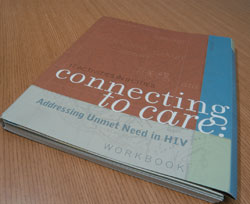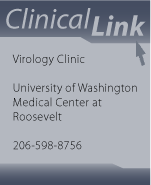Virology Clinic Receives National Recognition
Sometimes finding the resources to pay for medical care can be a daunting task, especially if a patient is uninsured or unemployed. Even more daunting is the series of applications and paperwork a patient must fill out to connect with these resources. But with the help of a financial advocate, getting connected to medical care can be easier.
 |
| The AIDS Action Coalition commissioned the Connecting to Care workbook. |
In the early 1990s, the UW Virology Clinic added a full-time position for a financial advocate to assist its HIV patients. The financial advocate enables patients get access to medical care by helping them successfully navigate the Washington Department of Social and Health Services and other health-care financing systems and by answering billing questions. Other duties include coordinating with the pharmacy to make sure the patient gets HIV medication without interruption while paying the minimal co-pay. Previously, these were the duties of the case manager, but were consolidated into one position to devote more time to help patients find the resources to pay for medical care and HIV medication.
The Virology Clinic's financial advocate activity received national recognition when it was featured in a workbook titled Connecting to Care: Addressing Unmet Need in HIV. The workbook highlights 17 approaches from nine American cities that successfully connect HIV positive people to medical care. The Virology Clinic's Financial Advocacy program benefits both the hospital and the patient.
"It is successful because it gets the hospital paid and patients have a person to go to for questions and to intervene to speed up applications if necessary," said Brian Myatt, the Virology Clinic's full-time financial advocate. "They know there's somebody to help them with questions. It's a lot of stress reduction."
Besides assisting with questions, the program also gives patients tangibles.
"Medications are a huge part of HIV care because there's no cure," said Page Baldwin, the lead case manager in the Virology Clinic. "They maintain quality of life. Generally a patient is taking at least three medications and the total bill can be in excess of $1,500 a month."
Another reason the program is successful is because it keeps the patients coming back.
"If they're confident their bills are being billed right, that keeps them coming back," Myatt said. "They're not inclined to come back if they're being sent to collections."
The program also gets patients better acquainted with clinic staff.
"It's a way our staff can build a relationship with the patient," Baldwin said. "That's key in keeping the patients."
The Connecting to Care workbook was commissioned by the AIDS Action Coalition and was distributed to every member of the United States Congress to raise awareness of HIV services and the need for financial advocacy. According to the Centers for Disease Control and Prevention, about 850,000 to 950,000 people have HIV infections in the United States. About 250,000 of them are aware of their HIV status but are not receiving regular primary medical care.
The workbook also went to other HIV service providers to serve as a resource for starting a financial advocacy program. It contains a collection of service approaches from agencies throughout the United States that provide HIV health-care services to diverse populations such as Native Americans, immigrant women, homeless individuals, and both rural and urban low-income patients.
